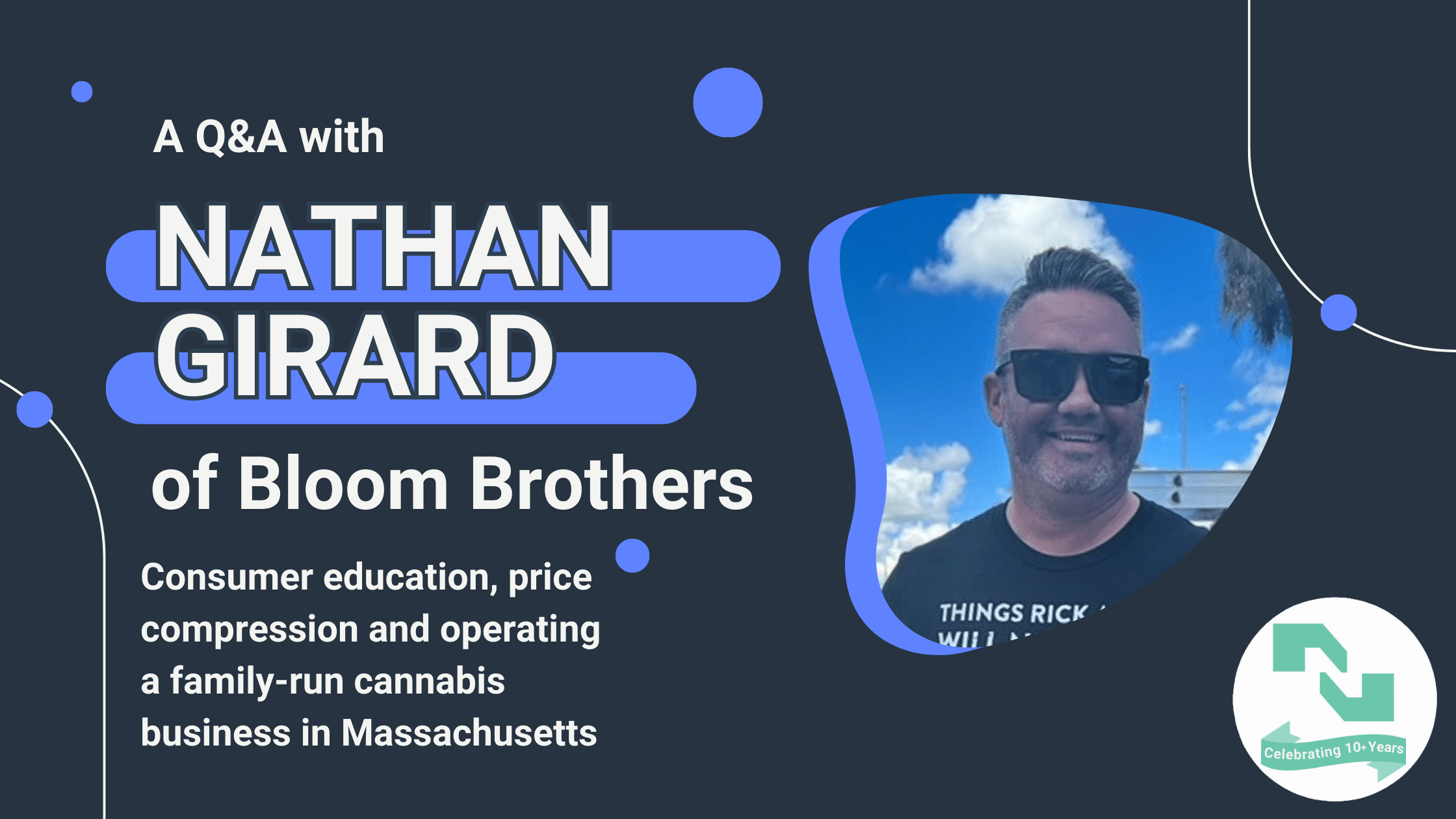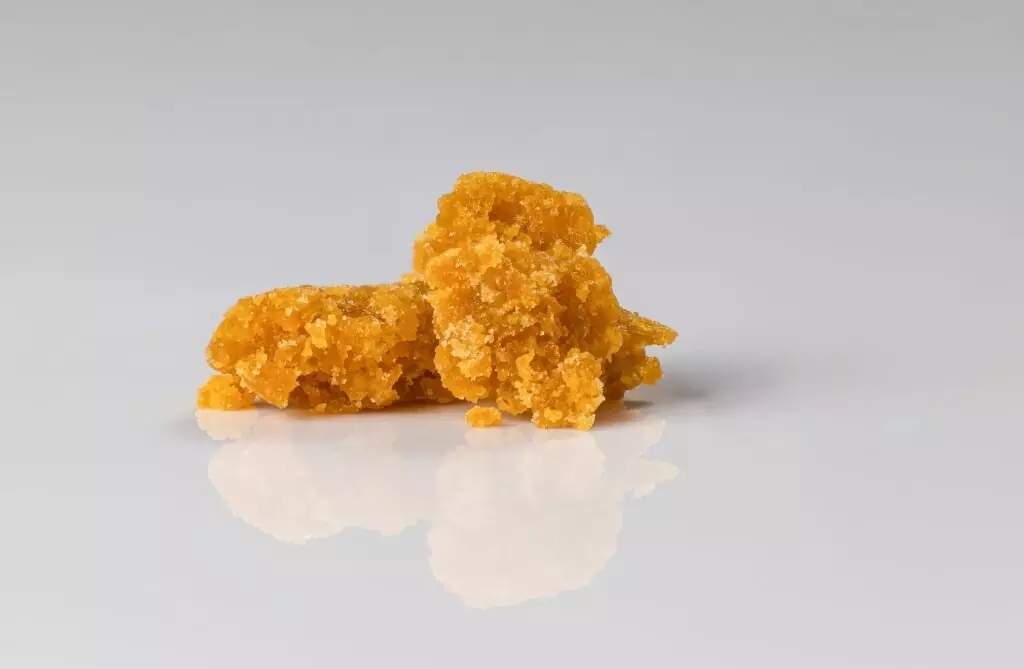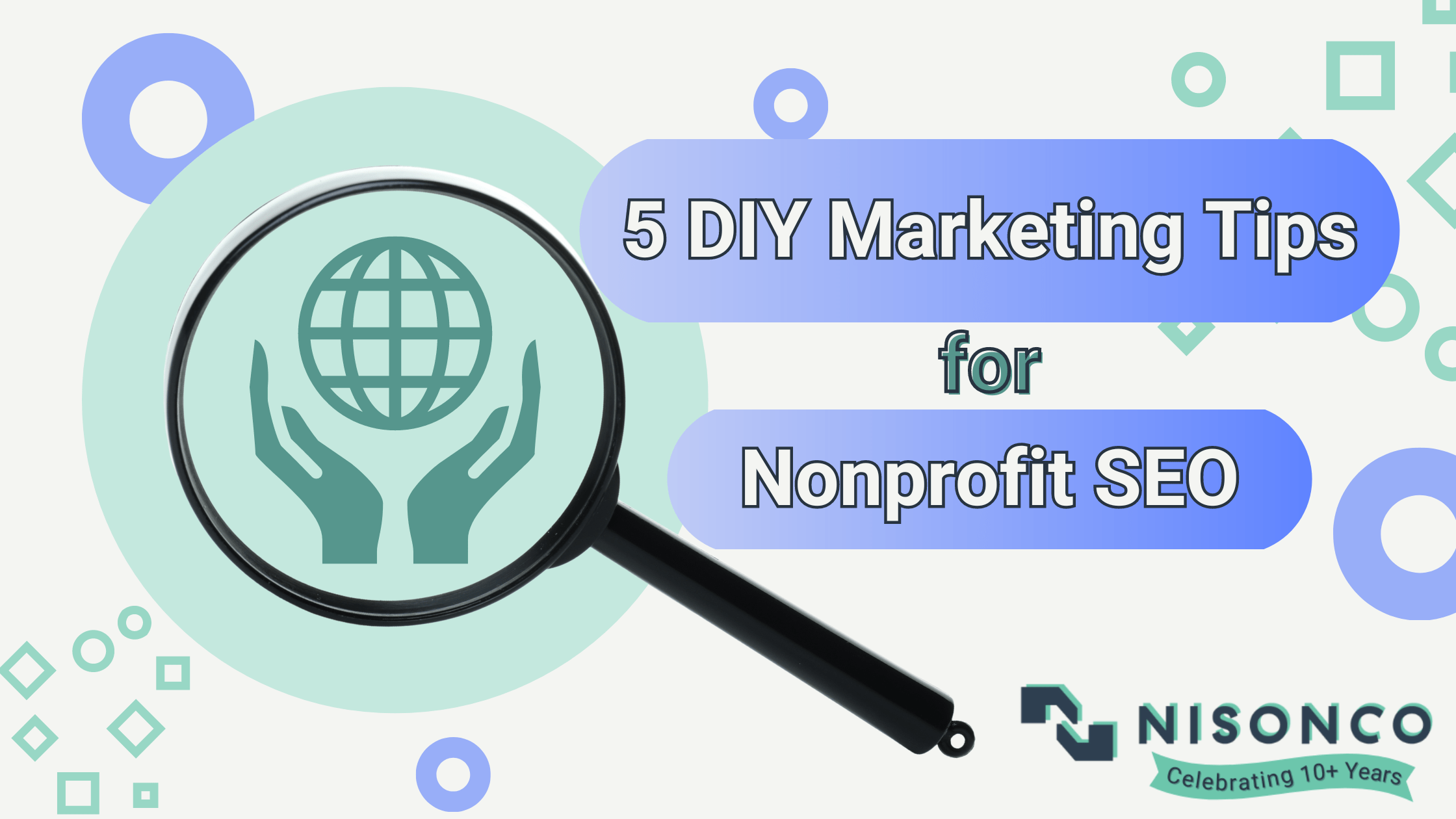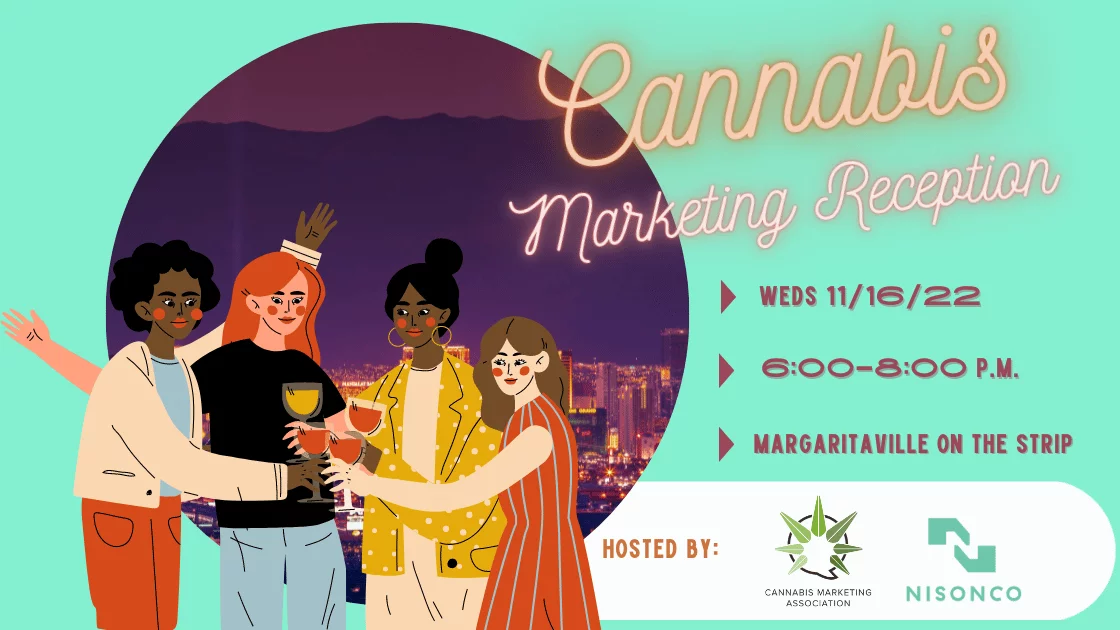Nathan Girard, co-owner and CEO of Bloom Brothers, is dedicated to transforming the cannabis retail experience and integrating it into customers’ lifestyles. In June 2024, NisonCo Content Director Marissa Black-Smith spoke with Girard at the Flower Expo in Greenfield, Massachusetts.
In the following interview, Girard discusses running a family enterprise, the importance of education in the cannabis industry, and the economic realities of the Massachusetts cannabis market. He emphasizes the significance of a customer-focused approach, the value of teamwork within his company, and the potential for expansion despite regulatory challenges. Girard also highlights his commitment to innovation through his ventures Lit Alerts and CannaVersions, aiming to provide data-driven solutions for the cannabis industry. Read on for the full interview.
Marissa Black-Smith: What does Bloom Brothers do?
Nathan Girard: Bloom Brothers is a recreational dispensary. We opened in mid-March of 2020 in Pittsfield, Mass. And we sell weed. We sell a lot of weed.
What are you seeing in consumer trends over the last year? What do you forecast moving into the future?
Nathan: I think consumers are getting smarter and smarter about what they want and what they put into their bodies. Ultimately, I think we’re seeing the trend that people are trying to make cannabis part of their lifestyle that may have otherwise never been part of their lifestyle before or may have been part of their lifestyle years and years and years ago, and they’re kind of trying to get back into making the elected choice.
Some of the daily conversations that I’m having with consumers are, you know, “Hey, normally I need to drink three bourbons in order to put myself to sleep, but I wake up the next day, and I feel like absolute crap. How can I get the same effect of how I feel after three bourbons — feeling really tired and needing to fall asleep into nothingness — without the after-effects associated with having those three glasses of bourbon?”
They’re looking for a similar function, right? Just drinking a cannabis drink or eating an edible — just eating a piece of candy — is going to give me a similar effect on my body. My body is going to feel tired. It’s going to feel like it wants to fall asleep. Then, when they wake up the next day, they don’t have those hungover feelings, that lethargy where it takes them three hours to get into their day. We’re finding that’s really the consumer nowadays.
When we first opened in March of 2020, the start of the pandemic, we were getting people in our store from every surrounding state daily. We were serving 600 customers most days. They were coming from New York, Connecticut, New Jersey, Rhode Island, Vermont, New Hampshire, Maine — all the other non-legalized states to get their product. They would take as much of the most potent stuff we had because they knew they were only coming once every few weeks. Nowadays, we might have a much lower transaction cart total, but we’re still doing a lot of transactions. And now we’re getting people coming in who are like, “What’s the freshest batch that you have? When was it harvested? What’s the terpene profile associated with that THC?”
It’s not just, “Hey, what do you got that’s 40% and is gonna get me real, real messed up?” It’s “Okay, I understand that strain is only 18% THC, but it’s got a 4.5% terpene concentration, and limonene really works well with me, so that’s what I want today, and I’ll only start with one see how it works. Then I can always come back and buy more.” The trend is really going toward more informed consumers.
Do you think we’re finally getting over that lack of education and seeing a better-informed consumer?
Nathan: We’re getting there. I feel like the industry as a whole, though, is still really young. It’s really hard to buy as a consumer. You know, “How do I know if I want Sour Diesel by Rhythm, or Sour Diesel by SPARQ, or Sour Diesel by Nature’s Heritage, or Curaleaf? How do I even know I want Sour Diesel?” Some people call Sour Diesel a Sativa; some people call it a hybrid. I’ve literally seen Sour Diesel as an Indica. It’s crazy. Who knows what the Sativa/hybrid/Indica play is?
I have found a lot of cannabis consumption for me is based on the mindset you have going into it. If you are going into cannabis hyper-paranoid, cannabis is only going to take that hyperparanoia, and it’s only going to make it way more prominent in your brain.
Marissa: I’m so guilty of that.
Nathan: Right. I think it’s a lot about what you do with your life. Say you struggle with going to work out every single day. If you look at working out like, “Ugh, I gotta work out today,” you’re never going to work out. But if you look at working out as, “I’m going to change my entire mentality, and I’m going to make myself a better person. I will carve out the 30 minutes a day even though I’m super busy.” If you carve it out and make it part of your entire day, you will do it. And that’s all there is to it.
It’s the same thing with cannabis or with consuming anything, right? I love the idea of somebody saying to themselves, “I am going to drink on the weekends, but I’m not gonna drink during the week so that I can drink in excess on the weekends.” It’s almost like they look forward to the weekend to be able to do the thing that they want to do. You can drink every day if you drink in moderation. I can have a glass of wine with dinner because I only have one glass of wine, but I think a lot of people can’t cut themselves off after one glass of wine. One glass of wine turns into an espresso martini, which turns into six shots, which turns into two nightcaps before bed. And that’s a problem, right? Whereas if you just did it in a way where your mentality was, “I’m only having one drink, I’m gonna feel really good, and I’m gonna get a nice buzz on it; I’m gonna be chatty and funny and all the things that I desire and love about the social aspect of the drinking,” that takes your mentality and flips it totally on the other side.
That’s what we’re finding with cannabis: It’s all about the mentality. It’s all about asking, “What are you doing? What’s your desired effect, and how can we make that effect better?” That [consistency] comes with education; it comes with making sure that you’re telling people to keep a little notebook on your side table while you’re consuming cannabis and write a note down because it’s hard to remember the next day what you were feeling at 11:15 at night before you fell asleep. You know, were you feeling almost drunk in a way? Were you feeling an altered state of mind? Were you feeling what you were desiring? And if you were feeling that, you know you have a good product on your hands that’s working for you.
With a lot of people, sometimes you’re not even going to get that desired effect until you use that product five, six, eight, or ten times, and your body develops a tolerance and adjusts to that product. It’s hard to understand that it will take some time. The first alcohol sip you ever had, you didn’t feel good the first time you got drunk, right? Or the tenth time you got drunk, or the hundredth time, but you start learning as you use alcohol, “All right, after two drinks, I’ve had enough,” and once you learn that about yourself, you know to make two drinks last all night long.
What are you expecting from the Massachusetts cannabis market this year?
Nathan: I think this year in Massachusetts, you’re going to see a much steeper decline in the price of cannabis. I think because there are so many growers and elected choices, wholesale cannabis is not even at the bottom of the barrel, but it’s already at the bottom of price compression. I think consumers are starting to realize [that]. Retailers are willing to sacrifice margins to bring a customer in. So, if I have to sell cannabis at a specific price in order to make enough money so I can survive, I have to. If I don’t sell this pre-roll for $10, I can’t pay the person that I’m ultimately sourcing this cannabis from.
It’s a volume game, too. I think at the end of the day, certain dispensaries will close. It’s just the reality of it. It’s just the nature of the beast, right? I don’t want to be one of those casualties. I want to be one of those triumphant dispensaries because I have 20 employees who rely on me, and their families rely on me to be able to pay them. We’ve never laid anybody off. We don’t intend to ever lay anybody off at the store. What we want to be able to do is prop those people up. I want people who work for me to be able to buy houses, have families, to be able to have 401ks and benefits. I think my customer base realizes that because we have a 4.9 rating on Google over the course of almost 2,000 reviews now. It’s very telling.
It sounds like you’ve spent time behind the dispensary counter yourself, which you just don’t see often.
Nathan: How can I, as a business owner, expect somebody to do something that I otherwise am not willing to do?
In my dispensary… [my staff] works with me — not for me — every employee in my business is a team member, and that’s how we treat people. We share in the wins; we share in the losses. If this company is super profitable, we will give out a nice big fat bonus at the end of the year. If this company barely scrapes by, we will be transparent with our staff. They know it. They see the sales. They see the day-to-day operation. And if we’re scraping by, we’re going to say to them, our priority is to make sure you’re still employed, you still have a job to come to, and we’re going to do whatever we can as a team to keep sales coming through the door. I want us all to be able to weigh in on the decisions that we’re making as a company.
That’s the only way you build a strong, coherent team. You have to have values and a mission that everybody resonates with. Otherwise, why are you even in business? Some businesses are successful without that mantra, but to be a family-owned brand and business, you have to be willing to put yourself on the line if you expect your employees to do the same for you.
Does Bloom Brothers have expansion plans in mind?
Nathan: We are in the licensing queue for New York. We’ve been there. We’re dying in the queue like everybody else. We’ve been there since November. We have a location that’s in Menands, New York. We have a special-use permit issued by the town, but we don’t have a license. We built out our location on our own dime, at our own risk. We know there’s a large amount of risk involved with it, but the majority of our customers come from the capital district in New York. So we’re just bringing our well-known model of service and our well-known business to them and bringing it closer to them. Rather than them driving an hour each way to come to our store, we’re going to make it so they only have to drive five minutes.
While seeking profits in this industry, how do we honor our roots?
Nathan: At the end of the day, profits come based on how you treat your customers. My roots are literally in the idea that the customer isn’t always right, but when the customer brings you a problem, do your best to provide them with a solution.
I am a solution-driven individual, as is my entire staff and my entire family. When a problem is brought to me, I always try to create a solution. I have also built a couple of cannabis technology companies based on the common problems that I was hearing from other operators and other folks who came to me with problems of their own and bottlenecks within their companies. I say to them, “Okay, if I build a solution for your problem will you pay me to use that service but not pay me an incredulous amount? Just pay me what you think it’s worth?”
I built Lit Alerts, for example, which is a company that does data recognition and analysis and interprets insights. From that, we’ve been able to develop a lot of relationships with suppliers that struggle with having appropriate data insights into how their product is selling within the market or opportunities for penetration where they may otherwise not exist. And we’re providing that data for $500 a month to people. There are other companies out there that charge a lot more, but we’ve been transparent in that. Can you afford 500 bucks a month to help you sell a lot of your product that you’re otherwise not selling? And the answer has been a resounding, “Yes.”
I’m Berkshires born and raised. So, we made an effort to open up a business and employ people from the Berkshires. That’s my roots. Since we’ve opened, I have watched half a dozen of my employees buy homes, start families, and get married. I’ve been there for my employees and I want to continue to be there for my employees no matter what happens.
I also work there on a day-to-day basis. My insurance, my benefits, and my 401k are through my own business. I’m not taking anywhere near the salary I could be taking if I were the CEO of another cannabis business. My salary would probably be 4X what I make right now, but I make enough to get by. The business also employs my two brothers and my wife. We are all owners, but we also all work there on a day-to-day basis.
So, if you really want to look at how to stay connected, I still get behind the cash machines. I still get behind the registers. I still interact with customers. I help where I’m needed. It’s not humble. It’s just that I wear a lot of hats, as any company owner should. Hats are important. You can’t ask somebody to do something that you otherwise would not be seen doing. And I’m not looking for recognition for it; It’s how you run a business and how you operate not just a profitable business but a legit business. If you get called to bat, you bat. So that’s how I stay true to my roots.



